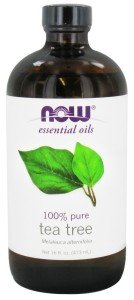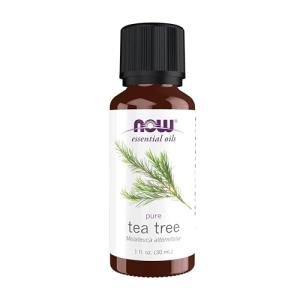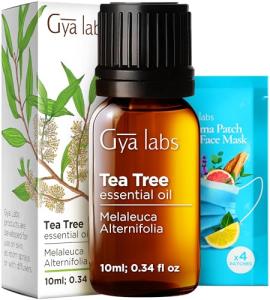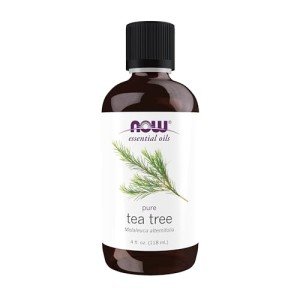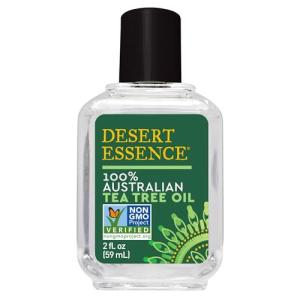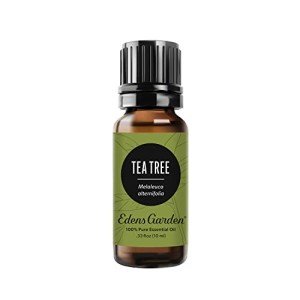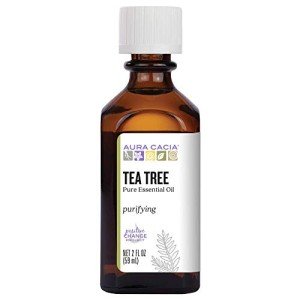Chemical Composition of Tea Tree Essential Oil
The therapeutic properties of tea tree oil can be attributed to its unique chemical composition, which includes a variety of bioactive compounds. The most significant components of tea tree essential oil are:
-
Terpinen-4-ol (30-48%) – This is the primary active compound responsible for tea tree oil’s antimicrobial properties. It has strong antibacterial, antifungal, and antiviral activity, making it effective in treating skin infections, acne, and fungal conditions like athlete's foot.
-
γ-Terpinene (10-28%) – This compound contributes to tea tree oil's antioxidant and anti-inflammatory properties. It helps in reducing skin irritation and promotes healing.
-
α-Terpinene (5-13%) – Known for its antiseptic and anti-inflammatory effects, α-terpinene is also thought to support the skin’s healing process and fight free radical damage.
-
1,8-Cineole (Eucalyptol) (3-7%) – This compound has mild antiseptic and analgesic properties, promoting respiratory health and improving circulation. In skincare, it also works as a mild astringent and can assist with minor skin irritations.
-
Terpinolene (1-5%) – Known for its antioxidant properties, terpinolene helps to stabilize the skin’s protective barrier and offers additional antimicrobial benefits.
-
Other compounds – Tea tree oil also contains traces of sabinene, α-pinene, and limonene, which further enhance its antimicrobial, anti-inflammatory, and antioxidant properties.
These natural compounds work synergistically to make tea tree oil a versatile ingredient in cosmetics and skincare, particularly for products aimed at treating acne, soothing inflammation, and supporting skin health.
Benefits of Tea Tree Essential Oil in Handmade Soaps and Cosmetics
Tea tree essential oil is an outstanding addition to handmade soaps and cosmetics for various reasons. Below are some key benefits of using tea tree oil in your formulations:
1. Antimicrobial and Antibacterial Properties
Tea tree oil is perhaps best known for its powerful antimicrobial properties. It can effectively combat harmful bacteria and fungi, making it an ideal ingredient for products that target acne, fungal infections, and body odor. When added to handmade soaps, tea tree oil helps to cleanse the skin of harmful microorganisms, promoting clearer, healthier skin. It can also help prevent the growth of bacteria on the skin, reducing the risk of infection from minor cuts or irritations.
2. Acne Treatment and Skin Cleansing
Tea tree oil has a long history of use as an acne treatment. The combination of antimicrobial and anti-inflammatory properties makes it particularly effective in treating acne-prone skin. Tea tree oil helps to reduce the redness and swelling associated with breakouts, while its antibacterial properties target the bacteria responsible for acne development. Adding tea tree oil to a handmade soap formulation can help cleanse the skin of excess oil and bacteria, preventing future breakouts and promoting a more balanced complexion.
3. Soothing and Calming Irritated Skin
Tea tree oil has natural anti-inflammatory properties that can help calm irritated or inflamed skin. It is an excellent choice for those suffering from conditions such as eczema, psoriasis, or dermatitis. When included in skincare products like soaps, creams, and lotions, tea tree oil can soothe skin irritation, reduce redness, and promote faster healing.
4. Fungal Treatment
The antifungal properties of tea tree oil make it a valuable ingredient in products designed to treat fungal infections such as athlete's foot, ringworm, or nail fungus. When used in soaps, tea tree oil can help to cleanse the skin and prevent the growth of fungal pathogens. It also helps in reducing the discomfort and itching caused by fungal infections.
5. Natural Deodorant Effect
Tea tree oil can also act as a natural deodorizer, neutralizing unpleasant odors caused by bacteria. This makes it an excellent choice for use in body care products such as deodorants, body washes, and soaps. It is particularly beneficial for people with sensitive skin or those looking for a natural alternative to commercial deodorants containing synthetic chemicals.
6. Promotes Healthy Scalp and Hair
Tea tree oil is also a popular ingredient in hair care products, particularly shampoos and conditioners designed for oily or dandruff-prone scalps. Its antifungal and antibacterial properties can help maintain scalp health, preventing dandruff and promoting hair growth. Adding tea tree oil to handmade shampoos can help cleanse the scalp, reduce itching, and alleviate dry, flaky skin.
How to Use Tea Tree Oil in Handmade Soaps and Cosmetics
When incorporating tea tree oil into handmade soaps and cosmetics, there are a few things to keep in mind to ensure both safety and effectiveness:
-
Dilution: Tea tree oil is highly concentrated and should always be diluted before use on the skin. Typically, for soap making, you should add between 1 to 3% of the total essential oil weight of the soap batch. For other skincare formulations, use about 5 to 10 drops of tea tree oil per ounce of carrier oil or lotion base.
-
Patch Testing: As with any essential oil, it is essential to perform a patch test before using tea tree oil-based products. Some individuals may have sensitivities or allergic reactions to essential oils. Test a small amount of product on the forearm and wait 24 hours to check for any adverse reactions.
-
Complementary Ingredients: Tea tree oil blends well with other essential oils like lavender, peppermint, eucalyptus, and lemon. These combinations can enhance its effects, adding additional skin-soothing, refreshing, or antimicrobial benefits. In soaps, tea tree oil pairs beautifully with moisturizing oils like olive oil, coconut oil, and shea butter.
-
Storage: Tea tree oil should be stored in a cool, dark place to maintain its potency. Essential oils can degrade if exposed to light or heat, so proper storage is crucial to ensure the product’s longevity.
Conclusion
Tea tree essential oil is a powerful and versatile ingredient that offers numerous benefits for handmade soaps and cosmetics. Its antibacterial, antifungal, and anti-inflammatory properties make it especially effective for treating acne, soothing irritated skin, and promoting overall skin health. By understanding its chemical composition and how it interacts with other ingredients, you can create natural, effective skincare products that harness the power of this remarkable essential oil. Whether you're formulating a soap for acne-prone skin or a body wash to help with fungal conditions, tea tree oil can be a game-changer in your handmade skincare routine.
